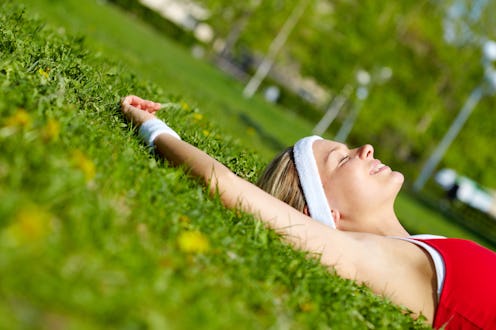Life
5 Recovery Rules to Guarantee Better Workouts

If you've ever felt like doing nothing the day after a hard workout, you can now drop the guilt. Turns out that taking time off from exercise — we're talking a day or two, not weeks — has a ton of body benefits. "Recovery is the secret to increased performance and is a critical component in unraveling the cumulative stress to your muscle tissue and nervous system," says LaShaun Dale, senior national group fitness manager at Equinox in New York City. "It is during the rest phase or recovery phase that the actual growth, learning and integration occur in the body, not during the workout, as many people think!" We asked Dale to share her five recovery tips so you can conquer that next run or boot camp like a boss.
1. RECOVERY IS NOT ONE-SIZE-FITS-ALL
Your buddy from yoga is going for round two the next day, but you can't think about another downward dog? Perfectly normal. "If you are deconditioned or new to a fitness regimen, even low impact activity may be highly taxing on your system, and you may need to take breaks," Dale says. So while another workout may be out of the question, consider a slow jog, walk, tai chi, stretching, or, heck, don't do anything. Completed a tough race or marathon? You're entitled to a few more days of recovery, which will help repair muscle tissue and joints, says Dale.
2. YOU CAN STILL MOVE ON YOUR DAYS OFF
If you're feeling pretty good the day after a hard workout, you don't have to sit on the couch. "On your off days, it is great to add active recovery. Doing light exercise such as yoga or swimming will help increase circulation, moving fibers and tissue so they are hydrated and heal quicker. Movement and circulation also drive nutrients into your muscles, accelerating the recovery process," says Dale. She suggests doing an activity that uses different movements and targets different areas of the body. So if you're addicted to spinning, try Pilates or Aqua Zumba on those off days. "Lighter training days where you change your training activity will help you recover from particular movement patterns and avoid physical overuse injuries," says Dale.
3. WHAT YOU EAT MATTERS, TOO
Paying attention to what you eat before and after you work out is important too, says Dale. Your workout snack may differ depending on what you're doing, but grabbing something rich in carbohydrates and protein is generally a good rule of thumb — think an apple with nut butter or a whole wheat English muffin with turkey. Got milk? Skip the sports drink and guzzle some dairy post-workout instead: Research shows that drinking chocolate milk can improve performance and body composition.
4. SLEEP IS (ALMOST) EVERYTHING
There are a million reasons you need to clock in at least eight hours per night — decreased cancer risk and improved brain function, for starters — but getting sufficient shut-eye can also help with workouts. Research has shown that exercise can improve sleep quality, but there's also the inverse relationship to consider: sleep improves exercise. "Sleep is one of the most critical energy balancers," says Dale. If you're in zombie mode after a night partying or tossing and turning, your fitness performance can suffer. Something as simple as crunches can seem like a struggle, or your regular 2-mile run might suddenly feel taxing. Think of sleep as a system reboot that will get you into gear for your next workout, physically and mentally.
5. MASSAGE, MASSAGE, MASSAGE
Treat yo' self! A rub-down is great after a rough week at work, but it's also insanely helpful after exercise: Research has found that massages can improve muscle function as well as reduce swelling and inflammation. If your budget cannot accommodate a monthly professional kneading, using a foam roller is also effective and way more wallet-friendly. A new study in the Journal of Medicine and Science in Sports and Exercise found that foam rolling significantly reduces muscle soreness and increases range of motion post-workout. Make time for a few foam-rolling exercises after your barre class or morning jog for fewer aches and more relief.
Image: Pressmaster/Fotolia